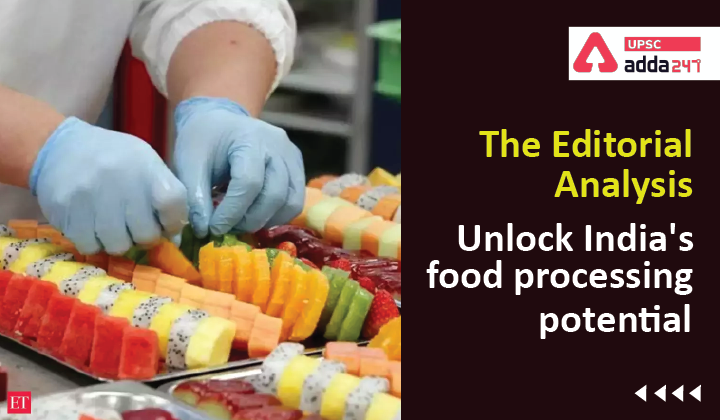Table of Contents
Food processing sector: Relevance
- GS 3: Food processing and related industries in India- scope’ and significance, location, upstream and downstream requirements, supply chain management.
Food processing sector: Context
- India’s food chain system should be both economically viable and ecologically sustainable. Fortunately, technologies are emerging that revamp the traditional approach of farm to fork and with a lower environmental footprint.
- Production-Linked Incentive Scheme (PLIS) is expected to incentivise the incremental sales in food processing sector.
PLIS progress
- Investment: A sum of ₹10,900 crore has been earmarked for PLIS and to date, 60 applicants have already been selected under Category 1, which incentivises firms for incremental sales and branding/marketing initiatives.
- Assuming the committed investment as a fixed ratio of their sales and undertaking execution of at least 75% of the projects, the sector is likely to witness at least ₹6,500 crore worth of investment over the next two years.
- Public infrastructure: A study in the United States concluded that a 1% increase in public infrastructure increased the food manufacturing output by 0.06% in the longer run. This correlation holds good for India too as a higher investment is being concentrated in States such as Andhra Pradesh, Gujarat, Maharashtra, Tamil Nadu and Uttar Pradesh.
- Export oriented: The 13 key sectors announced under the PLIS, including the ‘Food Processing PLIS’ earmarks a dedicated Category 3 for supporting branding and marketing activities in foreign markets.
PM Formalization of Micro Food Processing Enterprises (PM-FME)
How to ease access to credit?
- The pandemic has led to increase in number of people working from home. It has accelerated the demand for products from the ready-to-eat market which saw a rise of approximately 170% in sales volume between March-June 2020. Though it is expected to provide a boost to the micro-food processing units, lack of access to credit to the MSME could be a roadblock.
- Financing alternatives: Smart financing alternatives such as peer-to-peer (P2P) lending hold potential for micro-food processors as can be observed by the United Kingdom Government-owned British Business Bank, similar to India’s MUDRA Bank (Micro Units Development and Refinance Agency Bank).
- Trade Receivables Discounting System (TReDS): TReDS is a platform for facilitating the financing/discounting of trade receivables of MSMEs through multiple financiers. However, the platform requires considerable scaling-up and simultaneous enforcement of stringent measures for corporates to comply with. Integrating the TReDS platform with the Goods and Service Tax Network’s e-invoicing portal will make TReDS more attractive and give relief to financiers.

Food processing sector: Way forward
- Today, the staples of rice and wheat are being replaced by Nutri-cereals, plant-based proteins, fermented foods, health bars and even fresh fortified foods for pets.
- It is important that PLIS achieves its aim to create an enabling ecosystem for innovation in both food products and processes.
Also Read:



 TSPSC Group 1 Question Paper 2024, Downl...
TSPSC Group 1 Question Paper 2024, Downl...
 TSPSC Group 1 Answer key 2024 Out, Downl...
TSPSC Group 1 Answer key 2024 Out, Downl...
 UPSC Prelims 2024 Question Paper, Downlo...
UPSC Prelims 2024 Question Paper, Downlo...





